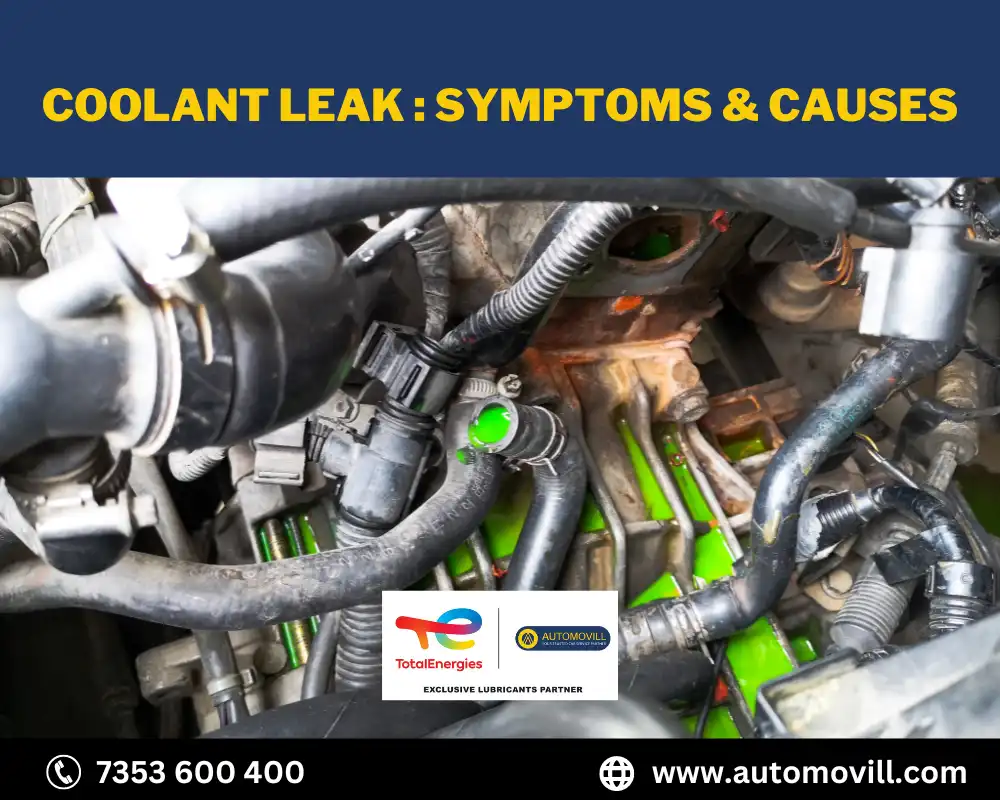
A coolant leak can be a really dangerous problem for your vehicle. The cooling system is essential for regulating engine temperature and preventing overheating, making it crucial to identify and address coolant leaks promptly.
In this blog, we’ll explore the symptoms and causes of coolant leaks, the seriousness of the issue, and the potential cost of repairs.
Common Symptoms of Coolant Leaks
- Low Coolant Level: The most apparent sign of a coolant leak is a consistently low coolant level in the reservoir or radiator.
- Overheating: If the engine temperature gauge rises significantly or you notice steam or smoke from under the hood, it may indicate a coolant leak.
- Sweet Smell: A sweet, maple syrup-like smell inside the car or around the engine compartment can be a sign of leaking coolant.
- Visible Coolant Puddles: Finding puddles of bright green, yellow, or pinkish fluid under your vehicle after parking can indicate a coolant leak.
- White Exhaust Smoke: Coolant mixing with engine oil can produce white exhaust smoke, indicating a possible head gasket leak.
- Coolant Warning Light: Some modern vehicles have a coolant warning light that may illuminate when there’s a significant drop in coolant level.
Causes of Coolant Leaks
- Damaged Hoses: Cracked, worn, or damaged coolant hoses are a common source of leaks. Hoses can deteriorate over time due to heat and pressure.
- Radiator Leaks: Corrosion or physical damage to the radiator can cause leaks. Regular maintenance can help prevent radiator issues.
- Water Pump Issues: A faulty water pump with a damaged seal can lead to coolant leaks.
- Loose or Damaged Coolant Reservoir Cap: The cap seals the coolant system, and if it’s loose or damaged, it can cause coolant to escape.
- Head Gasket Failure: A blown head gasket can allow coolant to mix with engine oil or leak externally.
- Heater Core Leaks: If the heater core, which heats the cabin, develops a leak, it can lead to coolant loss.
- Freeze Plug Failure: Freeze plugs, also known as expansion plugs, can rust or corrode, resulting in coolant leaks.
- Cracked Engine Block or Cylinder Head: In rare cases, cracks in the engine block or cylinder head can cause coolant leaks.

How Serious is a Coolant Leak?
- A coolant leak is a significant concern as it can lead to engine overheating, which may cause severe damage and potentially lead to engine failure if left unaddressed.
- Operating a vehicle with a coolant leak can result in reduced cooling efficiency, increasing the risk of engine overheating, especially in hot weather or during long drives.
- Ignoring a coolant leak can cause damage to engine components, such as the water pump, radiator, and head gasket, leading to expensive repairs.
Is it Expensive to Fix a Coolant Leak?
The cost of repairing a coolant leak can vary depending on several factors, including the cause of the leak, the extent of the damage, and the make and model of your vehicle. However, compared to the potential damage and costs associated with engine overheating, addressing a coolant leak promptly is relatively affordable.
- Inexpensive fixes may include replacing a damaged hose, tightening the reservoir cap, or fixing a small radiator leak.
- Repairs involving the water pump, heater core, or head gasket can be more expensive due to labor-intensive processes.
- If the engine block or cylinder head is cracked, it may require significant repair or engine replacement, making it one of the costliest scenarios.
Conclusion
A coolant leak should never be ignored, as it can lead to severe consequences for your vehicle’s engine. By recognizing the symptoms and causes of coolant leaks, you can take prompt action to address the issue before it escalates.
Regular vehicle maintenance and periodic checks of the cooling system can help prevent coolant leaks and ensure your car’s longevity and reliability on the road.
If you notice any of the symptoms mentioned, it’s best to consult a professional mechanic to diagnose and repair the coolant leak as soon as possible. Remember, proactive maintenance is always more cost-effective than dealing with major repairs later on.
